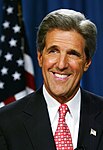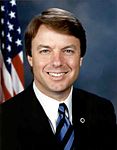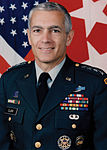Democratic Party (United States) presidential primaries, 2004
|
|
|||||||||||||||||||||||||||||||||||||||||||||||
|---|---|---|---|---|---|---|---|---|---|---|---|---|---|---|---|---|---|---|---|---|---|---|---|---|---|---|---|---|---|---|---|---|---|---|---|---|---|---|---|---|---|---|---|---|---|---|---|
|
|||||||||||||||||||||||||||||||||||||||||||||||
|
|||||||||||||||||||||||||||||||||||||||||||||||

|
|||||||||||||||||||||||||||||||||||||||||||||||
|
|||||||||||||||||||||||||||||||||||||||||||||||
The 2004 Democratic presidential primaries were the selection process by which voters of the Democratic Party chose its nominee for President of the United States in the 2004 U.S. presidential election. Senator John Kerry of Massachusetts was selected as the nominee through a series of primary elections and caucuses culminating in the 2004 Democratic National Convention held from July 26 to July 29, 2004, in Boston, Massachusetts.
Ten candidates vied for the nomination, including retired four-star general Wesley Clark, former Vermont Governor Howard Dean, and Senators John Edwards and John Kerry. For most of 2003, Howard Dean had been the apparent front-runner for the nomination, performing strongly in most polls and leading the pack in fund-raising. However, Kerry won the Iowa caucuses and New Hampshire primary, which gave him enough momentum to carry the majority of the rest of the states.
According to exit polls taking during the Iowa Caucuses, the top 4 issues were ranked as follows:
Despite being characterized by many as an election on Iraq, the economy and jobs were repeatedly cited as voters' top or one of top three concerns during the course of the primary season. In Iowa, of those who cited the economy as their most important issue, 34% supported Kerry, while 33% supported Edwards, with Dean trailing at 16% and Gephardt at 12%.
...
Wikipedia




